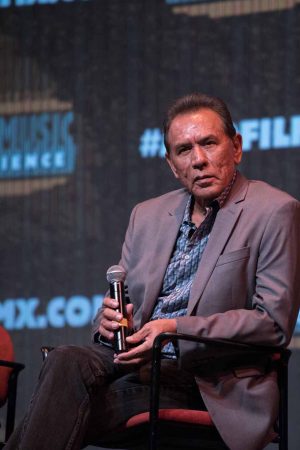By LYNN BARKER
Front Row Features
Albuquerque, N.M.—He’s one of the most recognizable Native American faces in entertainment. Actor Wes Studi, 69, originally from Oklahoma, is of Cherokee descent. In 1992’s “The Last of the Mohicans” celebrating its 25th anniversary with a screening at the Albuquerque Film & Music Festival, Studi played bad guy Magua, a vicious Huron Indian with a solid motivation to kill white people.
“Over the years, Native American people have suffered many things that we would be vengeful of. It really wasn’t a stretch for me,” the actor says.
Often breaking the Indian stereotype in entertainment, Studi also brought Tony Hillerman’s good guy “Lieutenant Joe Leaphorn” to life in a series of PBS specials produced by Robert Redford: “Skinwalkers,” “Coyote Waits” and “A Thief of Time.”
After receiving the AFME 2017 Impact Award, the actor, who lives in Santa Fe, spoke about the days right after his impactful, career-launching performances in 1991’s “Dances with Wolves” and 1992’s “Mohicans.”
“I was down on Hollywood Boulevard at a newsstand and I saw two policemen standing, looking at me like, ‘This guy looks suspicious,’’ he recalls. “Luckily, one of them came over and said, ‘I think I’ve seen you somewhere.’ The next 10 years, I got a lot of, ‘I’ve seen you somewhere. Don’t I know you?’”
After serving a tour of duty in the Vietnam War, Studi returned home with a taste for risk-taking and self-challenge. He found that adrenalin boost in acting.
“I tried things like bull riding and driving fast cars; just something that would give me a thrill,” he says.
“In stage acting, to be able to stand in the wings, come out, hit my mark and begin my dialogue was extremely, heart-poundingly exhilarating. Then, once you get out there and everything is working and clicking, it’s a wonderful thing even if somebody drops a line or jumps six pages ahead.”
He credits Oscar winner Al Pacino (“Scent of a Woman”) with the best description of the difference between stage and camera acting when he said, “When you are working for camera you have two good feet and you have a floor, but when you’re on stage, you’re on a tight rope.”
“You can’t do it again,” he assesses. “It’s immediate.”
Studi devotes much of his spare time to the Indigenous Languages Institute (ILI) in Santa Fe working to preserve and teach native languages like his native Cherokee which he admits he substituted for Huron when playing Magua.
“We had instructors for the French and Huron and just between us,” he says. “I actually used Cherokee for the Delaware parts of the dialogue. It’s a matter of using phonetics. It’s difficult but it can be done.”
Studi will next be seen as Cheyenne Chief Yellow Hawk in “Hostiles,” a historic drama about a legendary Army captain (played by Christian Bale) who reluctantly agrees to escort the chief and his family through dangerous territory in the 1892 American West.






